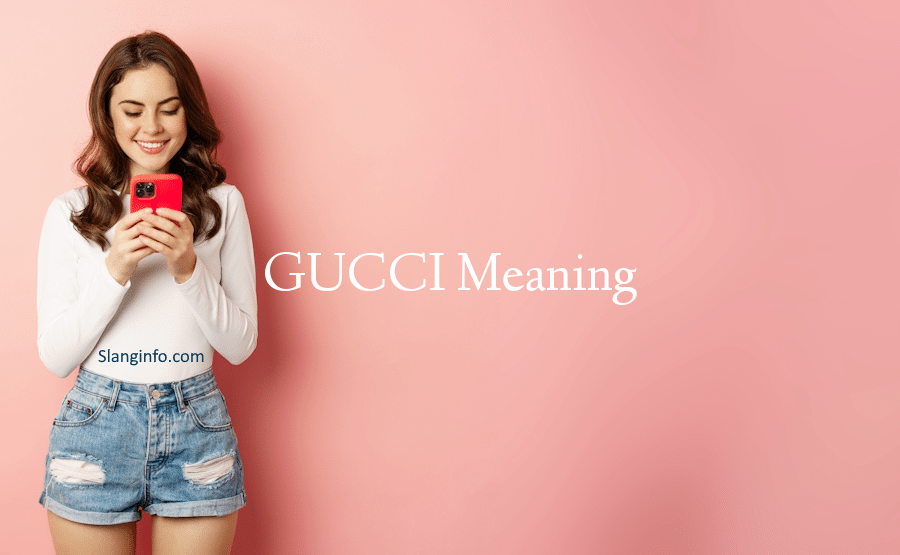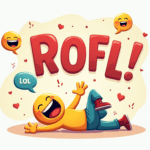When you hear the word Gucci, what comes to mind? Is it the iconic double-G logo, high-end fashion, or perhaps something entirely different? In recent years, “Gucci” has taken on a new life beyond the realm of luxury goods. This once-exclusive brand name has evolved into a versatile slang term that’s now part of everyday conversation. Let’s dive into the fascinating journey of gucci meaning went from representing Italian fashion to becoming a cool way to say something’s great.
| Key Takeaways |
|---|
| “Gucci” in slang means good, fine, or excellent |
| The term originated from the luxury fashion brand Gucci |
| It gained popularity through hip-hop culture and social media |
| “Gucci” can describe various positive situations or feelings |
| The slang usage has impacted the brand’s perception among younger audiences |
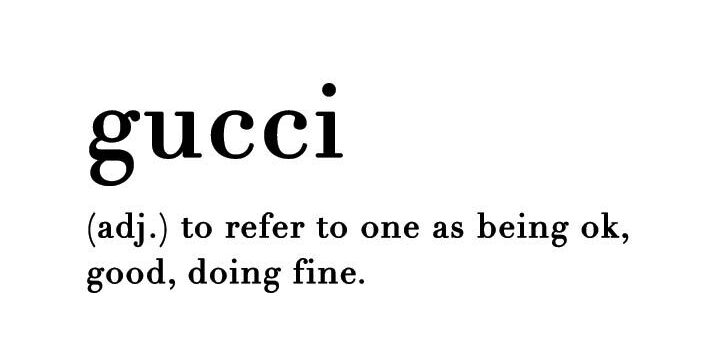
The Origin of Gucci
Before we explore its slang usage, let’s take a quick look at where “Gucci” came from. The Gucci fashion house was founded in Florence, Italy, in 1921 by Guccio Gucci. What started as a small leather goods company quickly grew into one of the world’s most recognizable luxury brands.
Gucci’s Rise to Fashion Prominence
- 1930s: Gucci expands to Rome and introduces canvas bags
- 1950s: The iconic green-red-green stripe is created
- 1960s: Gucci becomes a favorite among celebrities and royalty
- 1990s-2000s: Tom Ford revitalizes the brand, making it ultra-fashionable
This rich history set the stage for Gucci to become synonymous with luxury, quality, and style – key factors that would later influence its adoption as a slang term.
From Brand to Buzzword: The Evolution of “Gucci”
The transformation of “Gucci” from a brand name to a slang term is a perfect example of how language evolves in our fast-paced, interconnected world. This shift didn’t happen overnight; it was a gradual process influenced by several factors:
- Hip-Hop Culture: Rappers began using luxury brand names in lyrics to signify wealth and success
- Social Media: Platforms like Twitter and Instagram spread the term rapidly
- Youth Culture: Younger generations adopted and adapted the term for everyday use
Timeline of “Gucci” Slang Evolution
- 📅 Late 1990s: Early appearances in hip-hop lyrics
- 📅 2000s: Increased usage in music and pop culture
- 📅 2010s: Widespread adoption on social media platforms
- 📅 2016-2017: Peak popularity as a slang term
- 📅 Present: Continued use with evolving meanings
What Does “Gucci” Mean as Slang?
In its slang form, “Gucci” has taken on several related meanings:
- Good or Fine: “How’s everything?” “It’s all Gucci!”
- Great or Excellent: “That new restaurant was totally Gucci!”
- Cool or Fashionable: “Your outfit is so Gucci!”
- Okay or Agreeable: “Want to meet at 7?” “Gucci with me!”
The versatility of “Gucci” as slang is part of what makes it so popular. It can be used in various contexts to express positivity or approval.
Usage in Different Contexts
- Casual Conversations: Friends often use “Gucci” to describe their mood or situations
- Social Media: The term is frequently seen in posts, comments, and captions
- Text Messages: “Gucci” serves as a quick way to say everything’s good
For more insights into how slang evolves and impacts communication, check out our article on Gen Z slang.
The Impact of “Gucci” on Language and Culture
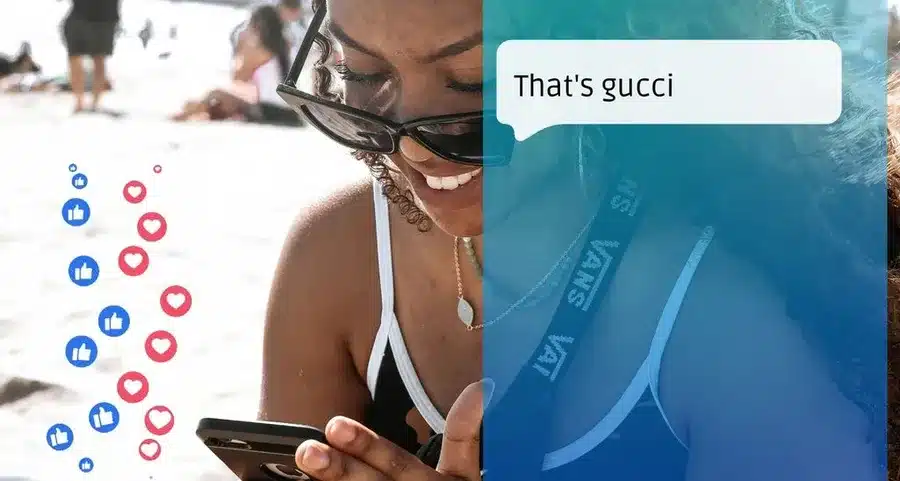
The adoption of “Gucci” as slang reflects broader trends in language evolution:
- Brand Influence: Other luxury brands have also become slang (e.g., “That’s so Prada”)
- Globalization of Language: Italian brand name becomes global slang
- Digital Age Communication: Short, catchy terms spread quickly online
Dr. Sarah Johnson, a linguist specializing in internet slang, explains:
“The transformation of ‘Gucci’ from a brand to a versatile slang term showcases the dynamic nature of language in the digital age. It’s a prime example of how commerce, culture, and communication intersect in modern times.”
This linguistic phenomenon isn’t just about using a cool new word; it reflects changing attitudes towards luxury brands and the democratization of once-exclusive terms.
For more examples of how brands influence language, take a look at our article on BUSSIN meaning, another term that’s taken on a life of its own in slang usage.
The Cultural Significance of “Gucci” as Slang
The evolution of “Gucci” from a luxury brand to a popular slang term reflects significant cultural shifts in how we communicate and express ourselves. Let’s explore the deeper meaning behind this linguistic phenomenon:
- Youth Culture: The adoption of “Gucci” as slang is particularly prominent among millennials and Gen Z. For these younger generations, using the term is a way to express individuality and social awareness.
- Social Media Influence: Platforms like Twitter, Instagram, and TikTok have been instrumental in spreading and popularizing “Gucci” as slang. Its short, catchy nature makes it perfect for quick posts and comments.
- Fashion and Lifestyle Aspirations: By using “Gucci” in everyday language, people connect with the aspirational lifestyle associated with the luxury brand, even if they don’t own any Gucci products themselves.
- Authenticity and Cultural Fluidity: The use of “Gucci” as slang signifies an acceptance of cultural mixing and a celebration of authenticity. It allows individuals to align themselves with trends regardless of their background.
For more insights into how language evolves in the digital age, check out our article on IYKYK meaning.
The Impact of “Gucci” in Marketing and Branding
The widespread use of “Gucci” as slang has had a significant impact on marketing strategies:
Marketing Impact of “Gucci”
- 🎯 Aspirational Marketing: Brands leverage the Gucci allure for perceived quality
- 👥 Youth Engagement: Appeals to younger audiences seeking fashion validation
- 🌐 Cultural Relevance: Creates connections with trend-aware consumers
- 📱 Social Media Promotion: Enhances brand visibility through influencer collaborations
- 🤝 Consumer Loyalty: Cultivates loyalty among luxury-aspiring customers
Many brands, even those unrelated to fashion, have incorporated “Gucci” into their marketing language to appear more relevant and appealing to younger consumers. However, this strategy can backfire if not executed authentically.
When “Gucci” Goes Wrong: Cringey Moments
While “Gucci” can be a cool and versatile slang term, its misuse can lead to some seriously awkward situations. Here are some examples of when using “Gucci” can become cringey:
- Overly Fashionable Outfits: Wearing multiple Gucci items at once in an attempt to show off can come across as trying too hard.
- Incorrect Usage: Using “Gucci” in formal situations, like saying “Everything’s Gucci, sir!” to your boss, can lead to uncomfortable silence or confusion.
- Social Media Overuse: Constantly posting selfies with captions like “Living my best life… Gucci style!” can be seen as inauthentic and attention-seeking.
- Forced Humor: Making jokes like “That’s so Gucci” about something clearly uncool often falls flat and creates awkwardness.
- Brand Bragging: Repeatedly mentioning Gucci in conversations to assert status can make social interactions feel unnatural and cringey.
To avoid these pitfalls, it’s important to use “Gucci” naturally and in appropriate contexts. Remember, the coolest use of slang is when it flows naturally in conversation, not when it’s forced or overused.
For more tips on navigating modern slang without embarrassment, take a look at our article on cringey meaning.
The Future of “Gucci” as Slang
As with all slang terms, the future of “Gucci” is hard to predict. However, we can make some educated guesses based on current trends:
- Continued Evolution: The meaning of “Gucci” may continue to shift and expand, potentially taking on new connotations.
- Generational Divide: As younger generations adopt new slang, “Gucci” might become associated with millennials and early Gen Z, potentially losing its “cool factor” over time.
- Global Spread: With the internet connecting people worldwide, “Gucci” as slang could spread to non-English speaking countries, potentially taking on new meanings in different cultural contexts.
- Brand Response: The Gucci brand itself might further embrace or distance itself from the slang usage, influencing its longevity.
- Language Integration: If “Gucci” remains popular long enough, it could potentially be recognized by dictionaries as a colloquial term, cementing its place in modern language.
Dr. Lisa Thompson, a sociolinguist specializing in internet language, offers this insight:
“The journey of ‘Gucci’ from luxury brand to versatile slang exemplifies the dynamic nature of language in our digital age. Its future will likely depend on how well it continues to resonate with users and adapt to changing cultural contexts.”
As we continue to navigate the ever-changing landscape of language and pop culture, terms like “Gucci” serve as fascinating examples of how our communication evolves. Whether you’re a fan of using “Gucci” as slang or prefer to stick to its original meaning, understanding its cultural significance can provide valuable insights into contemporary communication trends.
The Global Reach of “Gucci” Slang
The spread of “Gucci” as slang isn’t limited to English-speaking countries. Its usage has transcended linguistic boundaries, appearing in various forms across different languages and cultures:
- French: “C’est Gucci” (It’s all good)
- Spanish: “Está Gucci” (It’s cool/great)
- German: “Das ist Gucci” (That’s fine/good)
This global adoption showcases the power of internet culture in spreading linguistic trends across borders. It’s a testament to how brand names can evolve into universal expressions of positivity and approval.
For more on how slang travels across cultures, check out our article on international slang terms.
“Gucci” in Popular Media
The slang use of “Gucci” has made its way into various forms of media, further cementing its place in popular culture:
- Music: Numerous songs feature “Gucci” in their lyrics or titles, like “Gucci Gang” by Lil Pump
- Movies and TV Shows: Characters use “Gucci” to sound cool or trendy
- Social Media Content: Influencers and content creators often use “Gucci” in their posts and videos
Notable “Gucci” References in Pop Culture
- 🎵 “Gucci Gang” – Lil Pump (2017)
- 🎬 “The Bling Ring” – Film featuring Gucci-obsessed teens (2013)
- 📺 “Schitt’s Creek” – Alexis Rose often uses “Gucci” as slang
- 📱 Various TikTok trends incorporating “Gucci”
The Gucci Brand’s Response
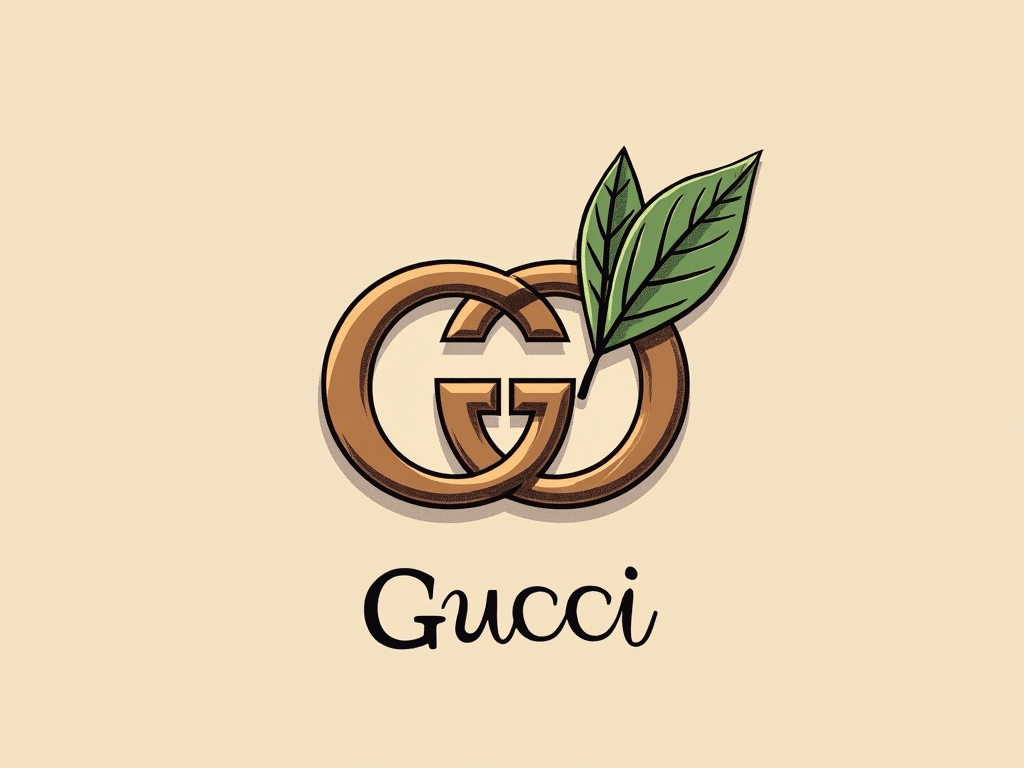
Interestingly, the Gucci brand itself has had a complex relationship with the slang usage of its name:
- Initial Resistance: At first, there was concern about brand dilution
- Gradual Acceptance: Recognition of increased brand awareness among younger demographics
- Strategic Incorporation: Collaborations with artists who use “Gucci” in their work
The brand’s ability to adapt to this linguistic evolution has helped maintain its relevance in a rapidly changing cultural landscape.
Ethical Considerations and Cultural Appropriation
As with many trends that originate in specific communities (in this case, hip-hop culture), the widespread use of “Gucci” as slang raises questions about cultural appropriation:
- Origin Recognition: Acknowledging the term’s roots in hip-hop and Black culture
- Respectful Usage: Using the term authentically rather than mockingly
- Economic Impact: Considering how the slang usage benefits or impacts the Gucci brand versus the communities that popularized it
It’s important to be mindful of these aspects when using “Gucci” or any culturally-derived slang. For more on navigating cultural sensitivities in language, see our article on cultural appropriation in slang.
The Future of Brand-Inspired Slang
“Gucci” isn’t the only brand name to become slang. This trend suggests a broader phenomenon in language evolution:
- Brand Influence: Other luxury brands like “Prada” or “Versace” are used similarly
- Tech-Inspired Terms: Phrases like “Google it” show how tech brands influence language
- Evolving Meanings: Brand names may continue to take on new meanings separate from their products
Dr. Mark Stevens, a marketing psychologist, notes:
“The transformation of brand names into slang reflects the increasing role of consumerism in shaping our language and culture. It’s a fascinating intersection of marketing, linguistics, and social dynamics.”
Conclusion
The journey of “Gucci” from a luxury brand to a versatile slang term is a fascinating example of language evolution in the digital age. It reflects changes in how we communicate, perceive luxury, and express ourselves in a globally connected world.
Whether you use “Gucci” in your daily conversations or prefer to stick to traditional language, understanding its evolution provides valuable insights into contemporary communication and cultural trends.
For more explorations of modern slang and its impact on language, check out our articles on GYAT meaning and FR meaning.

